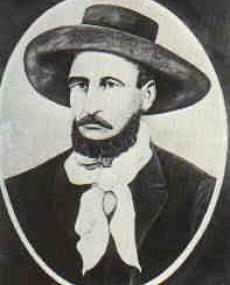
Piet Retief was born on 12 November 1780 in the Wagenmakersvallei, (known as Wellington today), Cape Province. He was the fifth of 10 children of Jacobus, a farmer and Debora Retief. His ancestors were from Provence in France. Piet Retief lived with his father until he was 27, after which he left the farm. He settled in Stellenbosch, Cape Province and tried his hand at a number of businesses — working as a clerk in a store, prospecting for land, building and the liquor trade. His liquor license was not renewed because Colonel Thomas Willshire complained that his soldiers were always drunk because of Retief's alcohol license. Most of his businesses were never really successful. He was constantly involved in lawsuits and financial difficulties.
In 1814 Retief married a widow, Magdalene Johanna (Lenie) Greyling, and adopted three sons and two daughters. He was an educated man and because of his involvement in various commandos he gained good leadership qualities. His letters indicate that he was a refined and intelligent person and known for his honesty, moral integrity and benevolence. These factors made him a good candidate for leadership in the Voortrekker community.
Retief bought a farm near the Koega River and eventually moved to Grahamstown, Eastern Cape where he made his fortune. He lost his money in a bad business decision and was forced to return to farming near the Great Winterberg.
During this time the Cape became a British colony. Great Britain began to introduce a series of reforms that angered many Boers. The Anglican Church became the official church of the Cape Colony, and with it came the English language and legal practices and norms.
Reforms that deeply affected many Afrikaners were laws prohibiting the slave trade and later, the abolition of slavery at the Cape. Moreover, compensation given for the loss of slaves was very little and should they wish to lodge a complaint, they were expected to do so in London. This meant that many Dutch farmers at the Cape lost a great deal of their wealth and Retief provided the Voortrekkers with leadership in this period. He mediated between the Afrikaner farmers and the British government, and when talks failed, helped to organise the migration of farmers to the north of the country, which eventually became known as the Great Trek.
He imagined a place where there would be "prospects for peace and happiness for their children" and "with resoluteness, the principle of true freedom will be esteemed" and a government with "proper laws," based upon the fundamental concept of "righteousness." He published a manifesto to this effect on 22 January 1837 in the Grahamstown Journal, which functioned as a declaration of independence for the Voortrekker farmers. He also became a leader of a group of Voortrekker group that later followed other Voortrekkers who had already decided to leave the Cape Colony in search of a better place far away from British control.
In 1837 his group arrived in Thaba Nchu, Free State and there it combined with a group of 300 Voortrekkers that had arrived in Thaba Nchu earlier. They considered Piet Retief to be their leader and elected him their governor. Thaba Nchu did not become a final settlement for the Voortrekkers. Piet Retief led his group across the Drakensberg mountain range in the hope of settling in a more fertile Zululand, Natal (now KwaZulu-Natal). This area was under the kingship of Dingane ka Senzangakhona, King Shaka's half brother. Using the missionary Francis Owen, Piet Retief sent a letter to Dingane telling him that he wished to live in peace with the Zulu people. In the same letter he pointed to the Voortrekker defeat of King Mzilikazi as a tactic to threaten King Dingane and prevent him from attacking the Voortrekkers.
Dingane tested the military capability of Retief's men by asking them to retrieve his cattle from Chief Sekonyela. He promised them that if they succeeded he would give them land to live on. Their success made Dingane aware that an outright battle with the Voortrekkers would not lead to Zulu victory. Dingane was also suspicious that the Voortrekkers were planning to ambush him. One night Piet Retief's men were seen moving closer to the inkandla, a Zulu royal homestead.
These events, together with Retief's messages that bad kings do not rule forever, was seen as sufficient proof that Retief was planning an attack against Dingane. As a result, Dingane conceived a plot to kill all of them. Piet Retief and his men were invited to a party to celebrate the return of King Dingane's cattle. They were requested not to bring their weapons to the king's kraal. On 6 February 1838, once they were all inside the kraal they were attacked and killed by Dingane's followers.